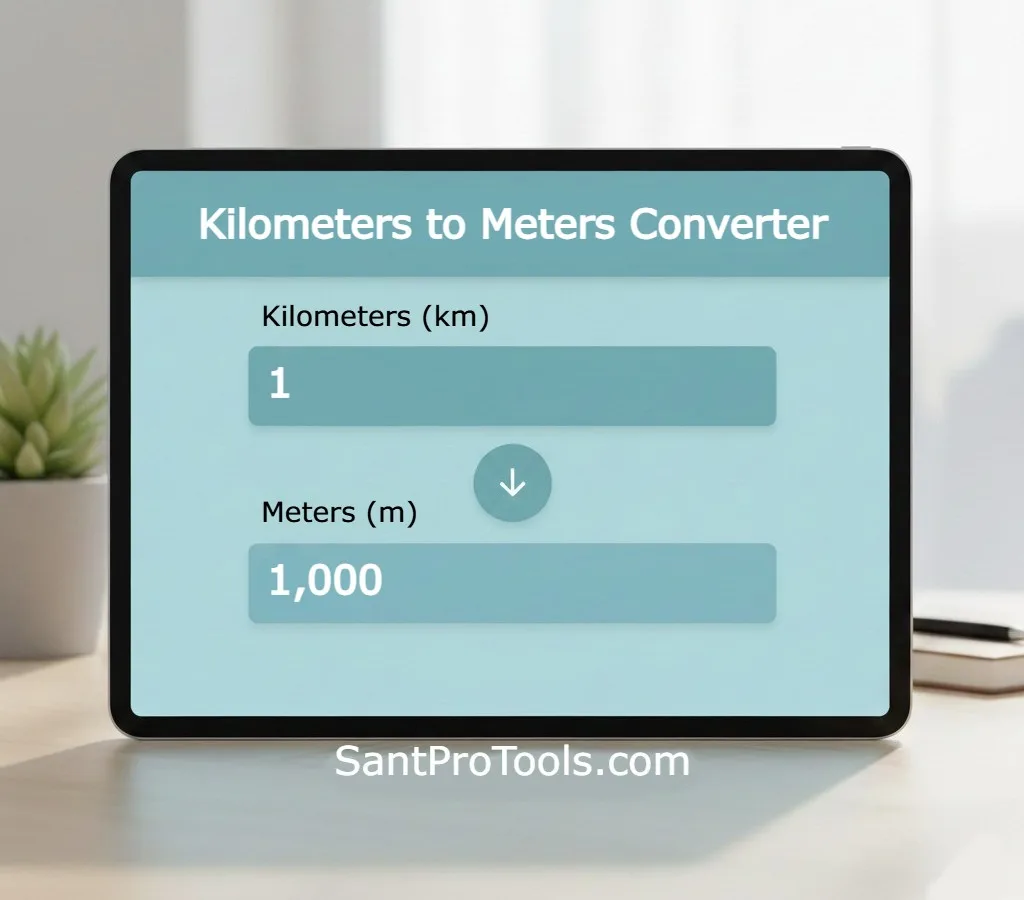Kilometers to Meters Converter - Convert km to m Online
Convert kilometers to meters (km to m) with our fast and accurate km to m converter. Enter any value in kilometers and get instant meter results with step by step conversion.
Conversion Results
Enter values and select units to see conversion results
Related & Other Popular Converters
Converting Kilometers to Meters is among the simplest and the most-used metric unit conversion. The use and understanding of kilometers and meters is beneficial in daily life whether you are a student, engineer, traveler, runner, or distance measurer. The Kilometers to Meters Converter allows you to convert kilometers to meters quickly and efficiently, but if you really want to understand How to Convert km to m manually, this guide covers all of the detail you need.
In this section we will cover the relationship between km and m, propose the appropriate formula, give an example of each, provide step by step calculations, and discuss other applications of converting kilometer to meter in school, construction, sports, GPS readings, navigation and scientific measurements.

What are Kilometers and Meters?
Km and meters are both units of metric distance:
Meter (m) is the base unit of length in the International System of Units (SI).
Kilometer (km) is a larger unit made up of 1000 meters.
Thus, 1 kilometer meter value is always:
1 km = 1000 m
This simple relationship makes the km to m conversion one of the easiest in mathematics.
Kilometers to Meters Formula
The formula for kilometer to meter conversion is:
meters = kilometers × 1000
This means you simply multiply any kilometer value by 1000 to convert km to m.
Examples:
Understanding the formula helps you calculate any 1 km meter or higher value instantly.
Why should we convert Kilometers to Meters?
Various situations in real life call for converting Kilometers to Meters:
1. Sports and Athletics
Running tracks, marathons, triathlons and bike races utilize a distance measure of meters.
2. Construction and Engineering
Engineers always use meter measurements for accuracy, even when a project map indicates a distance of kilometers.
3. Science and Research
When conducting scientific experiments, the experiment will ask for the exact meter value, not kilometers.
4. Navigation and GPS
Google Maps may sometimes display longer distances in kilometers, but will require calculation in meters for a specific route.
5. Education and Exams
Math and physics problems regularly require converting km and m units.
In all of these examples, using a Kilometers to Meters Converter makes the job simple and without added mistakes.
How to convert km to m manually?
Let's break it down into simple steps:
Step 1: Determine the value in kilometers
Example: 1 km
Step 2: Multiply the value by 1000
1 x 1000 = 1000 meters
Step 3: Write your final answer in quality meters
1 km = 1000 m
In this way, you can utilize any value. For example:
And this is where converting Kilometers to Meters becomes so simple.
Kilometers to Meters Conversion Table
| Kilometers (km) | Meters (m) |
|---|---|
| 0.1 km | 100 m |
| 0.5 km | 500 m |
| 1 km | 1000 m |
| 2 km | 2000 m |
| 5 km | 5000 m |
| 10 km | 10000 m |
| 50 km | 50000 m |
This table helps you perform quick km and meters conversions without using a calculator.
Benefits of using an online Kilometers to Meters Converter
Using our Kilometers to Meters Converter gives you:
Whether you are calculating for school assignments or professional measurements, the tool ensures perfect results every time.
Real Life uses of Kilometer and Meter units
Understanding the connection between km and m is important because both units are used in:
Thus, knowing how to Convert km to m helps you understand data in both personal and professional tasks.
Common mistakes to avoid
While converting Kilometers to Meters, avoid these errors:
Our tool eliminates these errors and provides perfect km to m results instantly.
FAQs
There are 1000 meters in 1 kilometer. This makes 1 kilometer meter conversion very simple.
The formula is: meters = kilometers x 1000
Multiply 5 x 1000 = 5000 meters.
Yes - 1 kilometer is equal to 1000 meters, making it a larger unit.
It is used in academics, navigation, GPS readings, engineering, and scientific calculations.
Yes - For example, 0.75 km = 0.75 x 1000 = 750 meters.